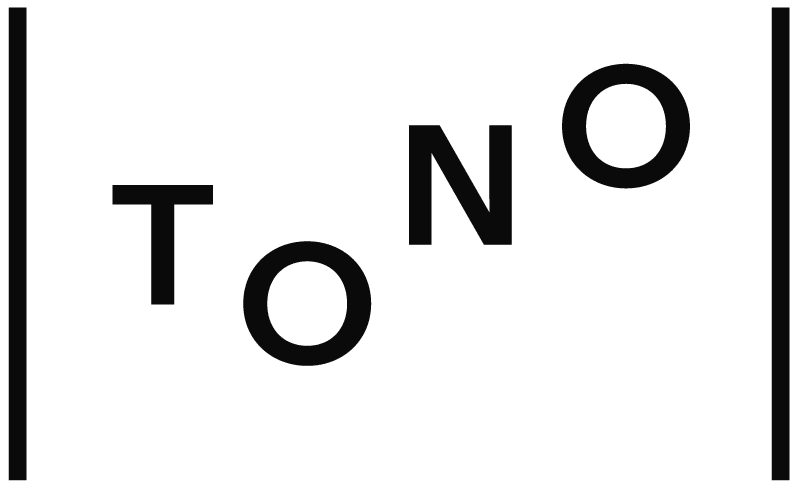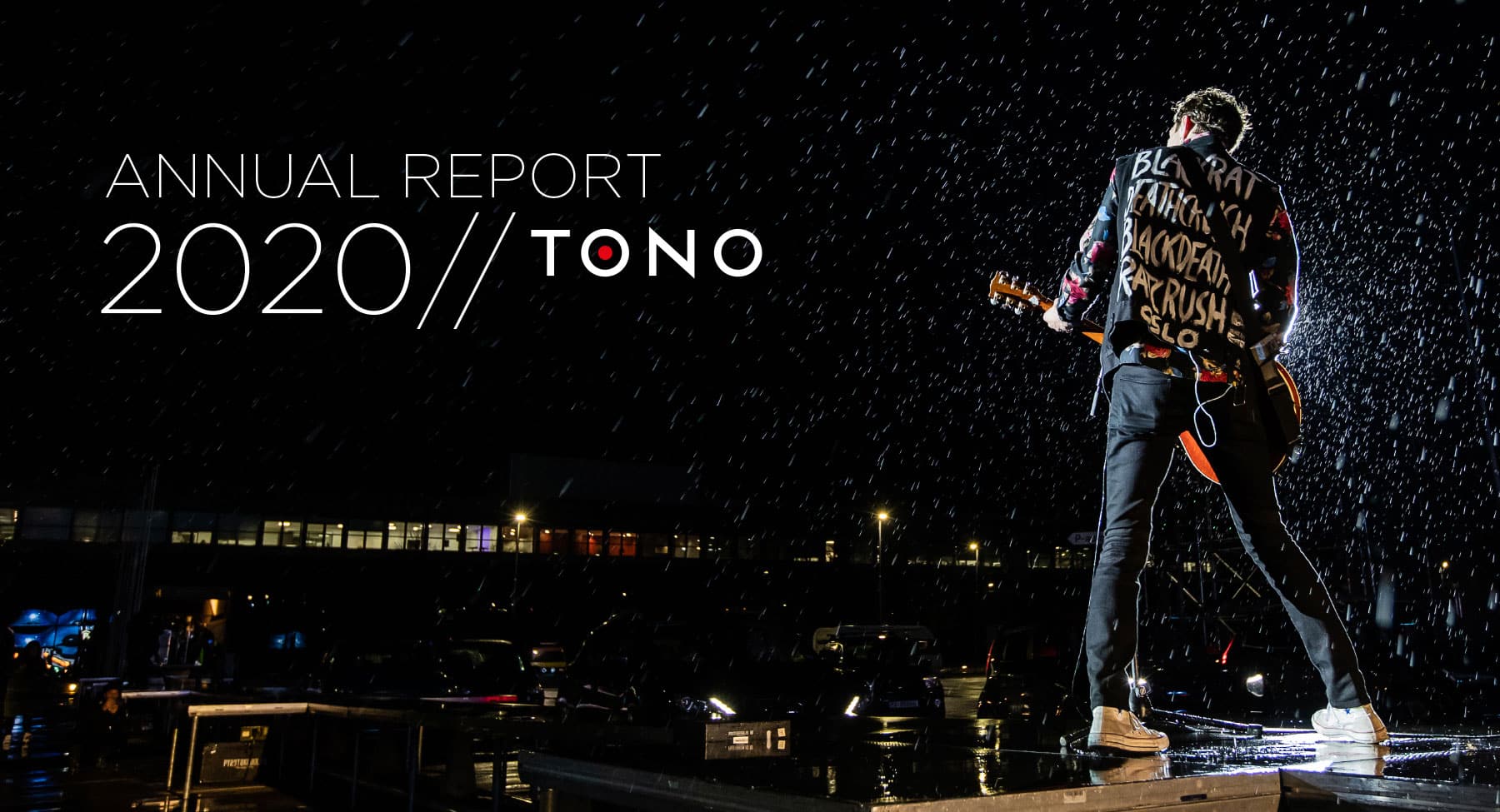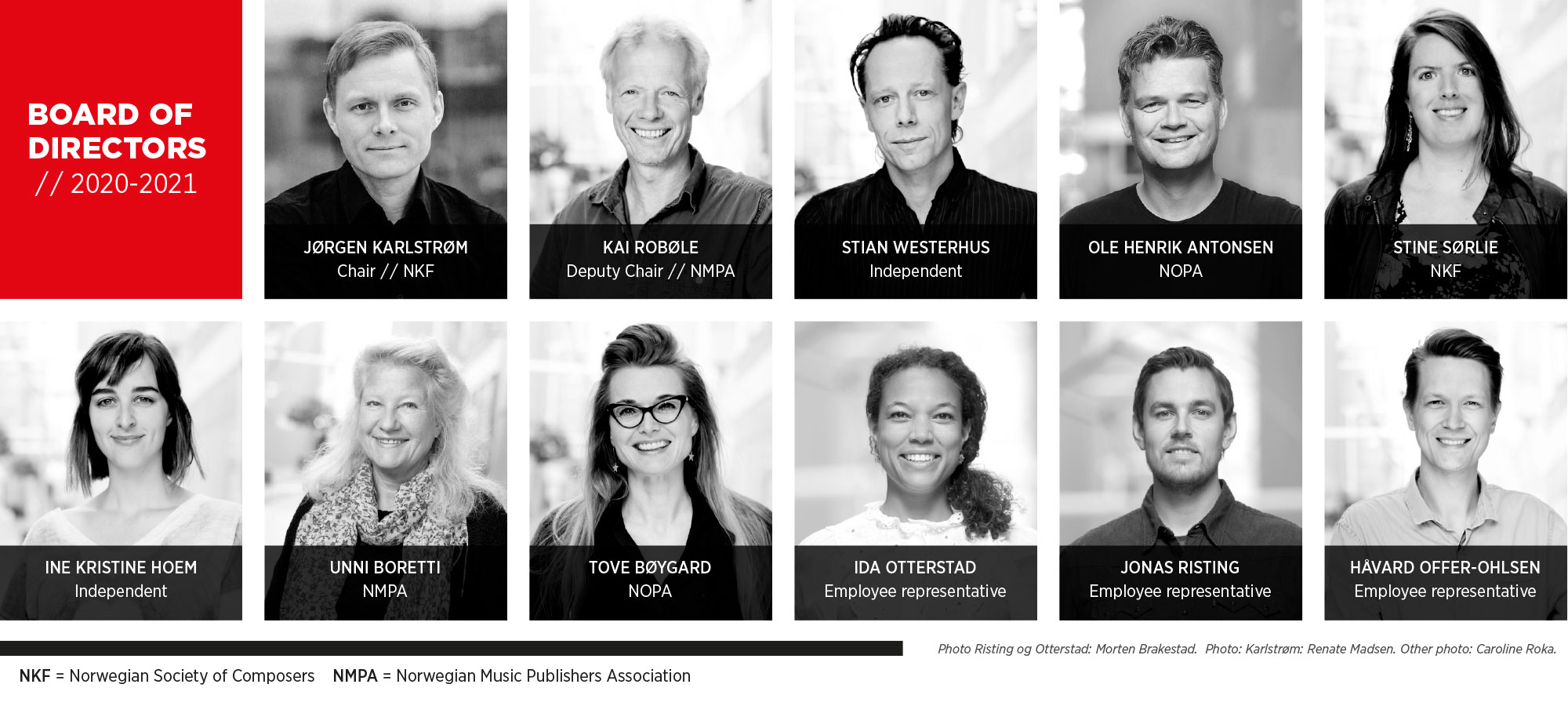



Current status and future development of the business
TONO SA (TONO) is a cooperative society that manages performing and recording rights relating to music. In addition to individual collection contracts with 35,910 rights holders, TONO has reciprocal representation agreements with 76 international sister companies, and thereby also manages their rights in Norwegian territory. TONO has delegated management of its rights holders’ recording rights to the Nordic Copyright Bureau (NCB) in Copenhagen, which is jointly owned by the Nordic collection companies Koda (Denmark), Stim (Sweden), STEF (Iceland), Teosto (Finland) and TONO.
TONO is operated from Oslo. Its office address is Tøyenbekken 21, NO-0134 Oslo, Norway.
In 2020, the board of directors held nine meetings, while board committees held 12 meetings.
Collection contracts
As at 31 December 2020, TONO had collection contracts with 35,910 rights holders. In 2020, 1,678 new rights holders were added, 18 of whom were music publishers.
By comparison, TONO had 34,233 rights holders as at 31 December 2019. In 2019, 1,650 new rights holders were added, 12 of whom were music publishers.
20 per cent of TONO’s members are women and 80 per cent men.
Music publishers comprise 1 per cent of TONO’s membership.
Shareholders
As at 31 December 2020, TONO had a total of 1,828 registered shareholders.
As at 31 December 2019, TONO had 1,752 shareholders.
Of the shareholders who are also creators, 16.6 per cent are women.
One per cent of TONO’s shareholders are music publishers.
Financial performance
TONO generated gross revenues of NOK 712,485,596 in 2020. This is a decrease of 7.61 per cent compared with 2019. After a 2 per cent deduction payable to the Norwegian Composers’ Fund, as well as losses and administrative costs, TONO had NOK 598,117,715 for distribution to rights holders, a decrease of 11.29 per cent compared with 2019. For the business as a whole, expenses accounted for 13.83 per cent.
The financial statements have been prepared in accordance with the Norwegian Accounting Act of 1998, and comply with prevailing laws, regulations and generally accepted accounting practice. The Accounting Act of 1998 caused material changes in the way pension costs were recognised in 1999. As a result, TONO’s recognised equity is negative. The original effect of this was a liability in the amount of NOK -11,026,446. As at 31 December 2020, the total effect of liabilities recognised in equity came to NOK -11,807,960. The year before, the liability totalled NOK -11,387,128.
Since TONO’s distributable income each year amounts to 85–90 per cent of its revenues, and the distributable income is the sum remaining after all costs have been deducted, the board of directors considers that TONO’s financial result for 2020 is good. This is particularly true in light of the fact that Norway was hard hit by the Covid-19 pandemic in 2020, and that the business’s overall financial position is strong. Continuation as a going concern is therefore without risk. There is a strong likelihood that TONO’s operations will achieve a good result in 2021, although it is expected that part of TONO’s business will be negatively affected by the Covid-19 pandemic.
TONO has at all times a large and liquid cash management portfolio. The objective is to achieve the highest possible return on investment at the lowest possible risk. TONO’s conservative investment strategy secures stable returns. Each individual investment shall be made among those with the lowest risk in their asset class. Risk is further reduced through a broadly composed portfolio, and TONO employs multiple financial services providers to reduce the management risk.
TONO administers ownership of the business’s premises in Sameiet Galleriet through the wholly owned subsidiary Harmoni AS.
Market developments
Norway was hard hit by the Covid-19 pandemic in 2020. The wide-ranging measures implemented to reduce the spread of the virus have severely impacted large portions of Norway’s business community and, not least, many of TONO’s members. TONO’s financial results for 2020 show an overall decline of 7.61 per cent from 2019. In must be mentioned in this context that the financial statements for 2019 were significantly boosted by an extraordinary payment in arrears of NOK 100.5 million from RiksTV.
Within the individual business areas, we see a Covid-related decrease in income particularly in the cinema, concert and variety sectors, but also to some extent in the area of background music, which covers hotels, restaurants, cafés, etc. We also see a decrease in royalties from TV broadcasts. However, this is because the 2019 result was exceptionally high as a result of the settlement of a long-running legal dispute with Riks-TV.
Losses within the above-mentioned areas are significant, but their overall impact on TONO’s income has been lessened by a significant boost in the online area, particularly driven by growth in film streaming services, as well as performances of TONO members’ music abroad. International income rose by 46.21 per cent from 2019 to NOK 95.72 million in 2020. This is the highest ever level of international income for TONO.
Throughout the fourth quarter 2020, TONO has engaged in a constructive dialogue with the Norwegian Ministry of Culture with respect to compensation for losses incurred by TONO’s members as a result of the national lockdown.
This resulted in an application for state aid by TONO. On 12 March 2021, the Ministry of Culture notified TONO that it would grant NOK 30,500,000 in state aid to TONO’s members, for distribution via TONO. The ministry will set out the principles for allocating this aid in a letter which, as at 15 March, TONO had not yet received.
TONO’s members will be notified via TONO’s website and in an e-mail of how and when the distribution of funds will actually take place.
TONO has continued to see good growth in its membership in 2020, and few members resign their membership. The trend towards direct licensing in the online area continues internationally. In the same way as many of TONO’s sister companies license their repertoires directly to streaming services without TONO’s help, TONO also licences its repertoire directly to the major music streaming services in conjunction with TONO’s sister companies Koda, Teosto and STEF, through the company Polaris Hub AB. TONO does not expect any particular changes in its rights portfolio in the current year.
After implementing a variety of measures to limit the spread of the virus, our human resources situation is stable, with staff working from home, and with tasks being performed more or less normally.
NCB
NCB is an independent legal entity, which is led by a board elected by Koda, Teosto, Stim, STEF and TONO. NCB’s operations are performed by Koda. This has proved to be an efficient solution for NCB as an organisation, as well as its owners.
NCB made an operating profit of DKK 5.8 million in 2020. This has been transferred to equity, which totalled DKK 48.7 million as at 31 December 2020. Overall phonogram sales are declining in line with increasing use of digital services, and NCB has adapted to the market situation, with a considerably reduced turnover.
TONO’s workforce
At the close of 2020, TONO had 65 permanent employees, of whom three work part time. In 2019, TONO had 60 permanent employees, of whom three worked part time.
It is TONO’s ambition that there shall be full equality between men and women. This means that there shall be no difference in the way men and women are treated with respect to salary, promotion and recruitment, for example. TONO’s workforce comprises 33 women and 32 men. Two men and one woman are employed on a part-time basis. The average age of the entire workforce is 46 (45.5 years for women and 46.5 years for men).
The average gross monthly salary for all female employees at the close of 2020, including managers, came to NOK 52.358. The average gross monthly salary for male employees, including managers, came to NOK 64.076. The higher average salary for men is attributable to the higher proportion of men in senior positions.
Internal control, HSE (health, safety and the environment)
The organisation’s HSE activities are systematised through the Works Committee (AMU). The Works Committee holds regular meetings. Efforts relating to sickness absence shall be discussed at at least two meetings per year.
TONO has had its own Inclusive Working Life (IA) agreement with the Norwegian Labour and Welfare Administration (NAV) for many years. The IA Agreement’s main objective was to foster the inclusion of everyone who is willing and able to work, either full time or part time. With effect from 2019, the IA Agreement has been extended to cover the entire labour market and is therefore no longer entered into with the individual enterprise.
In 2020, the sickness absence rate totalled 2.23 per cent, compared with 4.44 per cent the year before. Sickness absence is followed up in accordance with the IA Agreement and the provisions of the Norwegian Working Environment Act.
TONO does not engage in business activities that can pollute the external environment.
The employer’s duty to promote equality and prevent discrimination
TONO’s Code of Conduct, which all its employees have signed, contains the following provisions:
“TONO shall be a workplace with an inclusive working environment. Employees shall treat each other and those with whom they come into contact through their work with respect and integrity. TONO shall facilitate a working environment free from discrimination on the grounds of religion, skin colour, gender, sexual orientation, age, nationality or ethnic origin, or disability. TONO’s employees shall also contribute to a working environment free from bullying, abuse, harassment, etc. TONO will not tolerate any behaviour that may be perceived as degrading or threatening.” 00105}
Over time, it has been TONO’s goal to achieve a near equal distribution in the number of men and women in its workforce. As at 31 December 2020, women made up 51 per cent of its employees, while men made up 49 per cent. Men and women in comparable jobs receive the same salary.
Three employees work part time at their own request, partly due to the need to provide care at home and partly due to reduced capacity for work.
Welfare and care leave is divided equally between the sexes, but there is a higher level of sickness absence among the women than the men.
TONO pays attention to the issue of equality, and the statistics show that the Gender Equality Act’s requirements have been met.
TONO abides by the provisions of the Norwegian Cooperative Societies Act with respect to board representation. These require that both genders shall have at least 40 per cent representation on TONO’s board of directors.
TONO’s 65 employees are an ethnically diverse group. We have employees from all the Scandinavian countries, from elsewhere in Europe, as well as Africa, Asia and the USA.
We are therefore of the opinion that TONO promotes equality in accordance with the purpose of the Act.